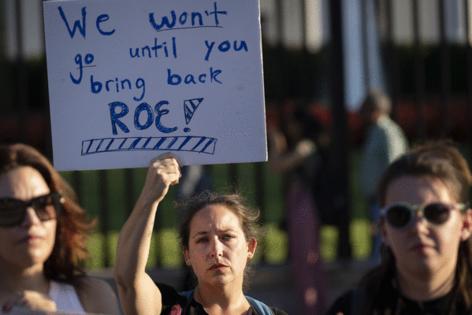Lisa Jarvis: Idaho's abortion ban is based on legal delusion and medical myth
Published in Op Eds
On Wednesday, a divided Supreme Court listened to arguments over a state’s abortion ban – its first such hearing since the justices overturned Roe v. Wade. The case, in which the Joe Biden administration is challenging Idaho’s abortion ban, literally puts the health and even the lives of pregnant women on the line.
The Biden administration is arguing that Idaho’s abortion ban should not supersede a 1980s-era federal law called EMTALA (Emergency Medical Treatment & Labor Act), which was designed to prevent hospitals from turning away poor or uninsured patients. The law was passed to stem a growing tide of patients being refused treatment. Under EMTALA, hospitals must stabilize someone whose life is at risk, including if it means terminating a pregnancy that puts them in immediate danger.
Saving a pregnant woman’s life sounds like a no-brainer, yet Idaho’s draconian abortion law only allows an abortion to be performed if it prevents the mother’s death, but not to protect her health. That puts doctors in the unfathomable position of deciding when a woman has teetered close enough to death that they aren’t breaking the law by treating her. If those doctors are later judged to have been too proactive, they could lose their medical licenses and even go to jail.
That has had a chilling effect on women’s health care in Idaho and beyond. Pregnant women have been turned away from hospitals across the country because they aren’t yet far enough over the precipice — maybe their blood pressure is dangerously high, but not yet life-threatening. Maybe they have an infection but have yet to show signs of sepsis.
And in Idaho, doctors fearful of prosecution are airlifting women to neighboring states. One of the state’s hospital systems has reportedly flown six pregnant women to other states since January. Some Idaho doctors are recommending that their pregnant patients buy insurance that covers emergency air transportation.
Yet several of the conservative justices seemed less worried about the potential for women to die and more concerned about how EMTALA could be used to undermine states’ rights. The discussion sometimes drifted into scenarios that are either extremely unusual situations or are pure fabrications meant to stoke concerns that striking down the law would create loopholes in abortion bans.
For example, US Solicitor General Elizabeth Prelogar had to frequently remind the conservative members of the court that in most of these emergencies, doctors are not making a choice between saving the mom and saving her baby — when a pregnancy takes such a dark turn, the baby is often not going to survive. She also had to remind them that in cases where the baby has a chance of survival, the the usual medical advice is to deliver the baby early, not to perform a late-term abortion.
Then there’s the medical myth, raised by the Idaho’s attorney Joshua Turner and probed by Justice Samuel Alito, that if this law wasn’t upheld, someone in a mental health crisis could show up at an emergency room asking for and receive an abortion. As Preloger noted, terminating the pregnancy in such a scenario would be “incredibly unethical” and wouldn’t address the underlying issue, which is one of brain chemistry.
Waiting to treat a woman in crisis could have serious consequences. Waiting to provide care could cause a woman to lose her fertility. She could end up with kidney or neurological damage. She will be doubly traumatized — by the unavoidable loss of an often much-wanted pregnancy and by the completely avoidable experience of being denied care. And of course, if doctors cut it too close, women could die.
As Prelogar succinctly put it, “It just stacks tragedy upon tragedy.”
The impact of laws like Idaho’s extends far beyond the pregnancies where something goes seriously wrong. They encourage doctors to leave the state. A recent analysis of publicly available data by the Idaho Coalition for Safe Healthcare, led by a group of local doctors, found that the state lost 22% of its practicing obstetricians in the 15 months after its abortion ban went into effect. Meanwhile, two hospital OB programs have closed, one more is expected to close, and another is at risk of closing, the group said. That has left half of the state’s counties without a practicing obstetrician. That’s a predicament several other states could find themselves in if the court allows Idaho’s ban to stand.
Ruling in favor of Idaho could also affect states where abortion care is legal. Healthcare systems in neighboring states will need to be prepared to absorb their patients, of course. But it could also encourage Catholic hospital networks, which treat one out of every seven patients in the US, to use the law to take a tougher stance against terminating pregnancies that threaten the life of the mother.
As I’ve written before, bans like Idaho’s don’t obviate the need for abortion care. They only pretend that need doesn’t exist. The health impact of these draconian bans is unambiguous, and flies in the face of good medicine.
____
This column does not necessarily reflect the opinion of the editorial board or Bloomberg LP and its owners.
Lisa Jarvis is a Bloomberg Opinion columnist covering biotech, health care and the pharmaceutical industry. Previously, she was executive editor of Chemical & Engineering News.
©2024 Bloomberg L.P. Visit bloomberg.com/opinion. Distributed by Tribune Content Agency, LLC.







Comments